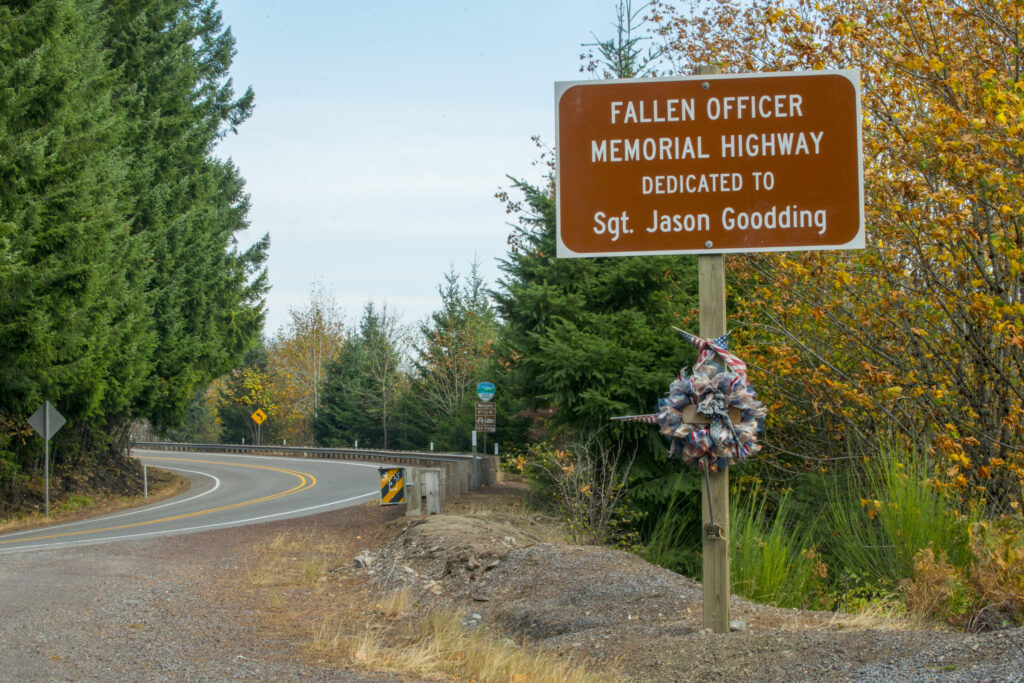
By JULIA SHUMWAY/Oregon Capital Chronicle
SALEM — Every day since May 4, the first bill on the agenda for the Oregon state Senate has been a resolution to honor a small-town reserve police officer shot and killed by a teenager during a car chase in 1969.
Every day since May 4, the Senate has adjourned without a quorum, leaving Gary LaVaughn Sumpter’s family waiting, as they have for more than 54 years, for their father’s sacrifice to be recognized by the state.
Rep. David Gomberg, D-Otis, who introduced a resolution honoring Sumpter, hasn’t yet given up on the legislative session. He keeps hoping that at some point in the next two weeks he’ll be able to call Sumpter’s children with good news, telling them to make the drive down from Longview, Washington, and see the Senate vote to honor their father.

“How do we explain to somebody who’s about to be honored that we just can’t get to it today?” Gomberg asked. “I don’t have words for that. We apologize a lot.”
Michael Sumpter, Gary’s son, said he didn’t understand the ongoing Senate Republican walkout, and asked if senators were still getting paid. They are – each senator makes about $253 daily between salary and per diem payments intended to cover meals and lodging – though the senators participating in the walkout also began facing daily $325 fines on June 5.
“What kind of job can you have where you don’t go to work and you still get paid?” he asked. “I have no control over it. My mom’s 83 and in poor health, and I was hoping it would happen in her lifetime, that’s for sure.”
Gary Sumpter was a reserve policeman in Toledo and the only officer on duty on March 15, 1969, when a call came in about a driver speeding toward Newport from a party in Corvallis, according to Newport News Times archives. The driver, 17-year-old Michael Meester, led an Oregon State Police trooper and a Newport police officer on a high-speed chase on the winding, forested highway before Sumpter joined in.
Sumpter and OSP Trooper William Clayton Durr caught up with Meester on Highway 229, in a wooded area about nine miles north of Siletz. Meester stopped his car, pulled out a hunting rifle and shot Durr, wounding him. Sumpter drew his own gun to return fire and provide cover for Durr, but Meester shot through the door of Sumpter’s car, killing him.
Meester sped off, running into a roadblock near Lincoln City where he shot and killed himself. In Toledo, Sumpter’s wife and young children received the news they never wanted to hear.
Michael Sumpter was nine when his father died. His sister, Julie, was seven and doesn’t have many clear memories of him.
Michael remembers him as a funny, fun-loving man. Gary Sumpter loved to hunt and fish, and he took his son with him on trips. One day, he woke Michael up wearing a Batman mask and shirt – the caped crusader was huge in the 1960s, with comics and a popular live-action television series – and yelled “Wake up! I need your help!” as he ran out of the room.
“It took 20 years to realize who it was, that it wasn’t Batman,” Michael laughed.
He also remembers the funeral, and how the police chief urged his mother to buy a nicer coffin that cost three times as much – even as a small child, Michael knew that shouldering that cost would be hard on the family. At the funeral, with police officers and dignitaries from around the state watching, Michael was in charge of carrying the triangular folded flag that had been draped over his father’s coffin and told he shouldn’t cry. He did, and he felt guilty about it for years.
Gary’s death plunged the family into uncertainty. Marcia Sumpter was a housewife with two young children who had never worked outside the home. Because Gary was a volunteer reserve officer, his family didn’t qualify for the same aid as families of fallen full-time officers.
Michael’s Boy Scout troop took up a collection and gathered $36 for the family, close to $300 in today’s money. The family sold Gary’s Toyota Land Cruiser – their two poodles scratched ecstatically at the garage door when they heard the car start, thinking Gary was finally home. And at the end of the summer they moved to Longview, where Marcia took a job at Sears.
The family, lawmakers and Toledo police aren’t sure how or why it has taken this long for the state to formally recognize Sumpter. Toledo Police Chief Michael Pace, who took over in 2019, noticed when going through files that it was odd that no one in the department had put Sumpter’s name in for recognition and tracked down the family, then reached out to Gomberg.
“One of my major goals that I’ve had in mind was to make sure that he was recognized for his sacrifice and to do it in an honorable way,” Pace said. “I reached out to Michael and asked him if his dad had ever received a medal or anything like that. They said no, and I couldn’t find any documentation that supported him receiving a medal. So when we get the plaque or we get the highway dedicated, I want to make sure that the family is recognized with the honors that his father and their relative deserve.”
Recognition from the Oregon Legislature means more than just a few minutes of attention on the House and Senate floors and a parchment copy of the resolution, although families of fallen officers receive those too. It’s also a required step before the state Department of Transportation can install a highway memorial sign, reminding everyone who drives past that Officer Gary LaVaughn Sumpter gave his life to protect a fellow officer.
Pace said he found the continued impasse frustrating, and he hopes politicians in Salem reach a resolution soon. Lincoln County, the cities of Toledo and Siletz and the Confederated Tribes of Siletz Indians all support the highway sign, he said, and they’re just waiting on action from the state.
Knowing that the Sumpter family is still waiting is one of many heartbreaking aspects of the continued stalemate, Gomberg said.
“That’s why these circumstances are so heartbreaking in so many different ways,” he said. “There’s big bills. And there’s other bills that are big in a more limited way, that may be the biggest one in their lives, and we just keep carrying it over.”
- Oregon Capital Chronicle is a nonprofit Salem-based news service that focuses its reporting on Oregon state government, politics and policy.


